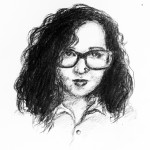At first, I did not like Thanksgivukkah one bit.
 For the uninitiated, Thanksgivukkah is pop culture’s latest portmanteau: a mix of America’s harvest holiday with the Jewish festival of lights. These celebrations rarely coincide. The former falls on the fourth Thursday of November, and the latter near the end of Kislev, a month determined by the lunisolar Hebrew calendar. According to JewSchool.com — perhaps the authoritative source on the matter by default — the last Thanksgivukkah occurred back in the 1800s. After this year, the two holidays won’t collide for some 70,000 years.
For the uninitiated, Thanksgivukkah is pop culture’s latest portmanteau: a mix of America’s harvest holiday with the Jewish festival of lights. These celebrations rarely coincide. The former falls on the fourth Thursday of November, and the latter near the end of Kislev, a month determined by the lunisolar Hebrew calendar. According to JewSchool.com — perhaps the authoritative source on the matter by default — the last Thanksgivukkah occurred back in the 1800s. After this year, the two holidays won’t collide for some 70,000 years.
Last month, BuzzFeed declared Thanksgivukkah “the best holiday of all time,” and given that the holiday hasn’t actually occurred in over a century, the endorsement is especially noteworthy. In the website’s guide, clairvoyant staffer Christine Byrne recommended appropriate seasonal mash-ups: turkey-shaped menorahs, do-it-yourself yarmulkes, “super decadent” horseradish-chive mashed potatoes.
When I first saw the BuzzFeed post, I laughed. But as my friends raved about the “menurkey” and pecan pie rugelach, something about Thanksgivukkah still felt strange. On a scale of “bah humbug” to “mazel tov,” you could say I was feeling “oy vey.” At the very least, the holiday begged for further analysis.
To me, that penultimate sentence was precisely the problem: Thanksgivukkah felt like a mix of metaphors, a clash of cultures. My objections ran much deeper than Byrne’s recipe for crunchy noodle kugel. The holidays seemed themselves to be in deep ideological conflict.
On one side of the aisle was Thanksgiving. It’s no wonder Norman Rockwell chose the holiday to embody the “freedom from want” he borrowed from Franklin Roosevelt. Thanksgiving exists to rejuvenate us. Embraced by the warmth of our family and friends, we are reminded of what is pure and true so that we may come to believe in and prepare for a brighter tomorrow. The holiday radiates with fundamental optimism, like many American narratives.
With Hanukkah came hope of another kind. The holiday, after all, was borne from scarcity made sacred: not bounty but limited resources. Public school taught me the Mayflower crew had enough supplies to feast with Squanto and his friends for three days, but in Hebrew school, I learned my Jewish ancestors barely had enough oil to last a week. Thanksgiving reminds us that things are always looking up, but Judah Maccabee’s scrappy army barely wiped its hands of King Antiochus when it had to deal with one of antiquity’s first energy crises. Hanukkah, like many Jewish holidays, is keen to remind us that future suffering is always imminent.
I worried that these two things were incompatible. I feared that a cohesive Thanksgivukkah would require us to isolate both parent holidays from any real meaning. I soon realized it was better to embrace the messiness.
Thanksgiving and Hanukkah are best understood just as the foods of the former holiday are best eaten: together, not touching, on the same plate. Their juxtaposition, in fact, symbolizes a valuable truth: that optimism and pessimism are often rightly felt, but each is only right in moderation. And the holiday itself serves as testament to the power of this kind of thinking.
Back on JewSchool, I learned that Thanksgivukkah is part of a larger phenomenon called the gradual “drift” of the Jewish calendar. The website warns that “if no action is taken,” the Hebrew calendar “will continue to drift later and later” relative to the Gregorian calendar: Passover, the Judaic celebration of the spring, will occur in the summer, while the fall High Holidays would sync up with the new year.
Still, in 2165, the first night of Hanukkah will coincide with the first night of Thanksgiving. Then, for 77,000 years, bupkis.
The thought of a calendar year with five digits sends me into Y2K panic. Something about the vastness of the future is scary. The world in 2165 I can maybe sketch out in my mind, but 79,013 is another story entirely: I can hardly conceptualize whether Earth’s inhabitants will exist, so their hypothetical ability to prepare challah-apple stuffing feels somewhat peripheral. And all of this fills me with Thanksgivukkah-induced existential dread.
In the face of that eternity, the lessons of the holiday remain. The Maccabees were right; future suffering is always imminent. But now, despite the coming darkness, there’s a holiday to celebrate. And to that, l’chaim! We should feel very thankful indeed.
Marissa Medansky is a junior in Morse College and a former opinion editor for the News. Contact her at marissa.medansky@yale.edu.







